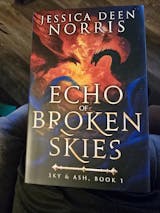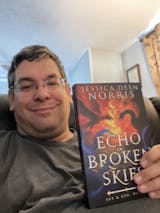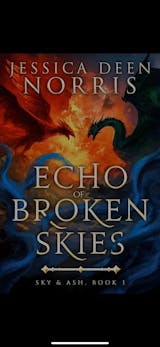Prologue
The stillness came first, then the cries.
Wren gasped then doubled over, one hand braced against the table as the wave of pain receded. The pain had no context, no reason for existing. And yet it pierced through everyone in the chamber like a shard of glass. It was unlike anything she’d experienced in twenty years of working as a midwife in the Resonance, where she’d seen every manner of suffering.
The pain disappeared, leaving only the chill she’d felt since she’d received the late-night summons. A tense messenger, his face shadowed by his hood, had appeared at her door with a heavy coin purse. He’d spoken of a lord and lady visiting the manor in the countryside, saying that the lady was experiencing early labor. They needed her right away—that was all she’d been told.
She hadn’t expected this.
She straightened, steadying her breath and surveying the room. Two maids stood frozen against the walls, their faces pale and eyes wide. Neither spoke. The only sounds were the crackling of the fire in the hearth and the soft patter of rain against the windowpanes—windows taller than Wren’s entire dwelling.
The air was strange … charged, like the moment before lightning strikes. The residual energy made the hair on Wren’s arms stand on end. She’d felt that somewhere before.
Clamor.
Wren turned away from the maids to face her patient. “My lady?” Her voice sounded too loud in the unnatural quiet.
The lady on the bed didn’t respond. Her face, contorted with the effort of childbirth only moments earlier, had gone slack. What should have displayed exhausted triumph was filled with a terrible calm.
Wren’s practiced fingers found the lady’s throat and searched for a pulse that wasn’t there. She pressed harder, desperation overriding her professional detachment, but the skin beneath her fingertips remained cool and unresponsive. A flutter of panic rose in her chest. This was beyond her experience, beyond what seemed natural.
Dead. Not from exhaustion or fever or any of a dozen common complications Wren had learned to combat over the years. The lady had simply … stopped. As if her life had been plucked away by an invisible hand, leaving an empty shell behind.
A thin, defiant wail cut through the silence.
The infant. In the chaos, Wren had almost forgotten the child. The baby was the reason for her presence in this grand room, with its tapestry-covered walls and silver candlesticks worth more than she earned in a year.
She lunged for the small, squirming bundle at the foot of the bed. A girl, red-faced and healthy, her cries surprisingly strong. Wren lifted the baby to her chest and reached for clean linens to swaddle the tiny body.
As her hand brushed the infant’s skin, she sensed a faint but unmistakable thread of energy, the same odd force that had filled the room moments before. It made Wren’s fingertips tingle and burn like she’d just touched nettles. She almost pulled away, every instinct within her screaming danger.
She closed her eyes, inhaled, then continued her work with methodical precision. Check breathing. Clean. Swaddle. The familiar routine anchored her against the rising unease that threatened to drown her.
As Wren wrapped the infant in soft linen under the flickering candlelight, she noticed the mark on the baby’s tiny wrist—the mark she had hoped not to find. This was something different … not the typical red blotches of a newborn. Paler than the surrounding skin, almost like a scar, though that was impossible on one newly born. It formed a subtle pattern, vaguely flame-like, rising from the delicate wrist up the forearm.
“It came from her,” a maid whispered behind her. “That … that feeling. It came from the child.”
“She killed her,” the other maid murmured. “The babe killed her own mother.”
“Cursed.” The first maid shook her head. “An ill omen.”
The words slithered through the room like smoke, poisoning the air. Wren turned sharply to the women.
“Enough,” she said, her voice stern. “Attend to your mistress. She deserves your respect, not your superstition.”
The rebuke silenced them, but their eyes remained fixed on the bundle in Wren’s arms, fear evident in every tense line of their faces. Not grief—not yet. Just fear. The same fear clawing at Wren’s insides despite her professional mask.
The heavy wooden door creaked open.
A man stood in the doorway, his tall, broad-shouldered frame silhouetted against the dimly lit corridor beyond. The lord. Possibly in his mid-thirties, he carried himself with practiced authority. His rich velvet doublet was the color of midnight, with matching dark hair that fell in precise waves over his shoulders. He didn’t move at first, as if crossing the threshold would make the scene before him real.
His gaze found his wife. The color drained from his face, leaving behind only a hollow gray.
“No.” The sound was broken and small, nothing like a lord’s normal commanding tone.
No one answered. No one needed to.
He moved, crossing the room in three long strides to stand beside the bed. One trembling hand hovered over his wife’s face before he gently brushed a strand of dark hair from her forehead.
The infant in Wren’s arms chose that moment to cry again, a piercing wail which seemed to shatter the man before her. He turned slowly until his eyes rested on the swaddled bundle.
Another rush of pain rippled through the room without warning. Wren gasped, clutching the baby tighter as her knees threatened to buckle. The maids whimpered, and one slid down the wall to the floor. Even the lord staggered, then braced himself against the bedpost with a grimace.
The pain receded as quickly as it had come, leaving everyone gasping for breath. Wren looked at the infant in her arms; the baby’s tiny face had calmed again, unaffected by the agony she somehow projected.
The lord’s grief transformed into shock, then his entire body recoiled.
“What …” he started. “What is this?”
Wren found herself holding the child closer, a protective instinct she couldn’t explain, even as the strange energy pulsed against her skin. “Your daughter. A strong, healthy baby girl.”
His eyes narrowed. He made no move to take the child. Instead, he drew back, his fingers curling into fists at his sides.
“A daughter,” he repeated, the words hollow. His gaze shifted between the infant and his dead wife.
The silence stretched, taut and dangerous.
“She’s an omen,” the maid on the floor whispered, her voice quavering. “Like a raven before death.”
Wren shot her a withering glare. “Hold your tongue or leave this room,” she snapped, but the damage was done.
“A raven,” the lord whispered, his eyes fixed on his daughter.
Wren wanted to offer words of comfort. Before she could utter a word, another man stepped out of the dark hallway and into the room. He was considerably older than the lord, with a severe, lined face and a white beard trimmed to a precise point on his chin. His face was stern, with the watchful eyes and rigid posture of one accustomed to authority. He was dressed in austere gray robes with silver fastenings, the understated elegance of a high-ranking official.
Wren relaxed. In the middle of labor, she could take the lead. But this … this was beyond her. She was grateful someone else was here to handle things.
The man moved to the lord’s side and leaned in, murmuring words too low for Wren to catch. His gaze flicked meaningfully in her direction.
The lord inclined his chin once, a movement that seemed to require great effort.
“See to it,” he said. “And ensure …” He paused, glancing at Wren, then at the maids. “Ensure absolute discretion.”
The stern man nodded and moved toward Wren, his hands extended for the child.
“The infant requires further examination,” he said. His tone didn’t allow for argument. “I’ll take her now.”
Wren’s chest seized, and she froze. She had never surrendered a newborn to anyone except their mother or father, but the coldness in the man’s eyes made it clear this was not a request.
Reluctantly, she placed the infant in his arms. The girl had quieted. Her eyes were dark, almost unnaturally focused for a newborn. She was beautiful.
“You are relieved of your duties, midwife,” the grim man said. “Your payment awaits you downstairs. Double the promised amount, for your trouble.”
For your silence, he didn’t say. He didn’t need to.
A third man appeared at Wren’s elbow, guiding her firmly to the door. She caught one last glimpse of the lord, still standing beside his wife, his face expressionless as he watched his daughter being carried from the room.
The journey through the house passed in a blur. Down winding staircases, through dimly lit corridors lined with portraits of stern ancestors, past closed doors behind which secrets remained hidden. Wren’s escort said nothing, his grip on her arm just tight enough to be a warning.
He finally released her in a small antechamber near the servants’ entrance, and a heavy purse was shoved into her hand.
“For your services,” he said, his voice low. “And for your discretion.”
Wren weighed the purse. Far more than the already generous sum she’d been promised when they’d summoned her from her modest home in the village three days ago.
“I don’t understand what happened,” she said carefully. “I’ve never seen anything like—”
“Nothing happened,” he said. “You delivered a child. The mother, sadly, didn’t survive. A tragedy, though not an uncommon one.”
“But the pain—everyone felt it. And the mother, she didn’t die from fever or—”
“Nothing. Happened.” Each word was enunciated with cold precision. His eyes, flat and emotionless, bore into hers. “You would do well to remember that. For your own sake.”
The threat hung in the air between them. Wren thought of how easily powerful families, especially the kind who could afford such secluded estates, could make inconvenient people disappear.
She clutched the purse tighter, the coins inside digging into her palm. Twenty years of bringing new life into the world, and she had never been paid to forget a birth.
“You just delivered the child,” he continued. “You never felt anything unusual. You will speak of this to no one. Is that clear?”
She nodded, not trusting her voice.
“Good.” He opened the door, revealing the wet cobblestones of the outer courtyard. “Go now. Do not return.”
Wren stepped out into the cool night air, the heavy door closing behind her with a loud clang. The rain had lessened to a gentle mist that left beads in her hair and on her cloak. She exited through a side gate, and after the stifling atmosphere inside, every breath she took outside the walls felt like freedom.
The surrounding countryside slept as she rushed along the dark, muddy track toward her village. The only sounds were her own hurried footsteps and the distant hoot of an owl. Ordinary life went on as usual, unaware of what had happened behind those high walls.
But Wren knew. She pulled her cloak tighter against the chill and quickened her steps. She would go home and hide the purse. She would tell no one what she had seen.
But she knew, and she would not forget.
The child would have a name by now, chosen by the father who had looked upon her with such horror. Wren wondered what name he would give to a daughter born of death and power—a daughter he clearly feared.
Whatever the name, Wren suspected the world would hear it someday.
She just prayed she would not be there when it did.
You may also like
From the beginning to the end had me wondering what was going to happen next I can't wait for the next book
NEVER a disappointment!!!!!
I loved THE DRAGON GUARDIAN CHRONICLES written by Jessica. The books were easy to read and hard to put down. Written for all ages was a definite plus. I felt confident recommending them to all ages of readers.
But this book!!!!!!??????? Oh my goodness! Jessica has out done herself. Her imagination for all things fantasy, magical and creative are just amazing.
What I loved is that I can pronounce all of the names of the characters and the locations!!! 😁 No more skipping names or “making up” names to use. But what I absolutely thought was the best part was the way she developed the characters in this first book of the new series. Time was well spent developing them, their backgrounds, their homelands, all the things that we will need to know as we anxiously await the following books!!!
I recommend this author all the time, for two reasons….
#1. She is an amazing author, knows her audience and sometimes leaves us hanging….for a bit.
#2. She is my cousins daughter and I could not be more proud of her and her work. My mother always said Jessica had an amazing imagination and she was spot on.
Buy the book, download the ebook, get it any way you can, just get it and read!!!!! You will not be sorry!
Give it as a gift to a young person that may not KNOW they love reading. In fact, get them The Dragon Guardian Chronicles and get them hooked, then gift them with Echo of Broken Skies to continue to fuel their love of reading!
My TBR list is quite long but I read the first couple of chapters and I have moved this book up near the top, excellent read thus far!!!
I'm half away through this fantastic book amd am loving it. Life has been a bit crazy here, which is why I am not further along. Already looking forward to the next book.
This book is amazing. Had me hooked from the beginning. Loving the dual story line and am wondering how it’s all gunna come together in the end. I’m hanging on to every word. Loving it so far and know I’ll continue to love it as I continue to read it.
A compelling adventure and emotional tale of hidden magic, corruption, twisted prophecy and survival.
Two souls bonded by magic, destiny and a prophecy of sky and ash, both forced to hide their powers and stay invisible.
Raven fears her destructive powers but yearns for freedom and truth, while Derron hides his powers and journeys on an unexpected path hoping for validation and acceptance.
I loved the themes of found family, mythical creature bonds, and unexpected heroes.
It's an epic ya fantasy adventure filled with high stakes, action, rescues, character growth and resilience, and surviving a prophecy twisted by fear and corrupt leaders.
Excited for the next book.
Loved every part from the prologue to the epilogue! Lots of action and adventure! Dual plotlines follow two young protagonists who are trying to find a place in the world where they won't be persecuted for their magical abilities. They spent their entire lives hiding in fear of being discovered.
The dual plotlines keep the story moving quickly. Eventually, their paths cross. Lots of twists & unpredictable events follow Derron & Raven everywhere they go. There were no spicy scenes, but there were definitely a few OMG dramatic moments that were sad and unexpected. There are interesting magical creatures with distinct personalities that add depth to the story. The realm building & map are wonderful tools to draw the reader in to another place & time.
I listened to the audio version for part of the story and read the ebook version for the rest. Both formats were good. The narrators were interesting. The artwork on the book cover is gorgeous! This book is appropriate for ages 12-adult. I'm looking forward to the next book in the series.
Meet the Author
Hi, I'm Jessica!
Award-winning author and homeschooling mom of five
I've always loved a good hero.
I write heroes my kids can relate to - underdogs that are still inspiring. In a world flooded with gritty, dark fantasy, I wanted to see something a little brighter.
But the world isn't all sunshine and unicorns (I wish!), so my books show the battles between good and evil. I think the difference, however, is a light of hope - and good heroes.
Then toss in a dragon or two, and I'm hooked!







































